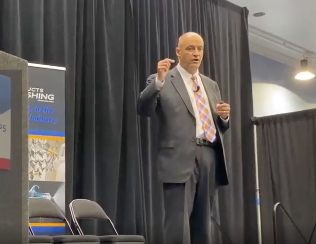Leadership. In Three Words.
You can boil the keys to leadership down to three words. Leaders get the behaviors they exhibit, expect and tolerate.
#management

Matt Kirchner delivers a keynote presentation at Products Finishing’s Top Shops Expo.
Photo Credit: Products Finishing
This isn’t a completely original idea. Years back I heard a leadership guru espouse the idea that team members will behave based on what we expect and tolerate of them. Decades of leadership experience have led me to the conclusion that he was two-thirds correct and I later added the word exhibit to complete the trio.
Leaders get the behaviors they EXHIBIT. Perhaps this truth is best exemplified by the words of William Wallace to Robert the Bruce in the movie Braveheart. “Men don’t follow titles,” Wallace espouses, “they follow courage.” In other words, most team members won’t respect their leader based on what title appears on the leader’s business card or LinkedIn profile. They will respect a leader who acts the way the leader expects their team to act. If you want your team members to work hard, then work hard. If you want them to follow through on their commitments, follow through on yours. If you want them to treat each other with respect, treat them respectfully. If you want them to spend the company’s money as if it were their own, don’t expect them to stay in $80 hotel rooms and then spend $250 on yours.
Featured Content
Growing up I had a friend whose father smoked incessantly and drank too much. His father also had strict rules prohibiting his children from smoking or drinking. When my friend confronted his father about this dichotomy his father responded, “Do as I say, not as I do.” Sadly, many leaders direct their teams with the same level of hypocrisy and as a result, their teams will never reach their potential for greatness. Great people will follow hypocritical leaders only until a better opportunity comes along.
Leaders get the behaviors they EXPECT. Do each and every one of your team members know exactly what you expect of them? When a manufacturing company I ran was struggling to meet production standards and improve productivity I confided in a friend who asked me a simple question. “How do your team members know at the end of each day whether they won or lost?” That question changed our company. As soon as we set key performance expectations that were 100% measurable and relevant for every member of our team, from the front office to the plant floor, they rose to the occasion and we improved significantly.
Setting expectations can take many forms. They can include setting specific metrics and measurements for business performance objectives like quality, delivery and efficiency but can also include expectations on individual performance like punctuality, responsiveness, communication and co-worker interaction. Do you set specific expectations for your team or do you leave performance and results to chance, hoping your team members will figure it out on their own?
Leaders get the behaviors they TOLERATE. Exhibiting the right behaviors and setting the right expectations are key, but leaders also have an obligation to call out team members out when they fail to meet expectations or emulate the leader’s positive example. Tacit acceptance of the failure of a team member to meet expectations sends the message that underperformance is okay, and not just to the underperforming employee but to other team members who look on as a leader looks past underperformance.
Many leaders are uncomfortable confronting an offending team member so they let poor performance pass. I once witnessed a discussion on this subject between two of my colleagues, one of whom had a reputation for confronting unacceptable performance with ease and the other who was less comfortable doing so. The second colleague admitted that he was uncomfortable raising performance issues with employees. The first colleague responded simply by saying, “You have to get over that.” Those six words have stuck with me for a long time and I repeat them to myself whenever I feel the least bit apprehensive about redirecting behavior on the part of our team.
The practice of not tolerating underperformance includes having a knack for when and how to raise a concern. Once, during the implementation phase of an acquisition when I and others were working 90-100 weeks, one of our board members took me to task for paying a supplier one week late. Rather than thanking me for essentially abandoning my young family for several months in the interest of the company, he chewed me out for an honest oversight. Years have passed and it still makes me angry to think about it. There’s a time to raise concerns and a time to let them go and knowing which to do when is part of the art of leadership. In either event, ignoring chronic underperformance never makes it go away.
What is the key to leadership? Three words. Leaders get the behaviors they exhibit, expect and tolerate.
RELATED CONTENT
-
Mechanical Vapor Recompression Evaporation
MVRE is underutilized in the treatment of industrial wastewaters that are typical of metal fabricating and finishing industries. Increasing energy costs, rapidly decreasing freshwater resources, and growing sensitivity towards the environmental impact of industrial management practices are the driving forces in the development of more sustainable technology.
-
National Association of Metal Finishers (NAMF)
Founded in 1955, the National Association of Metal Finishers (NAMF) is comprised of management executives in the surface finishing industry and related fields.
-
Matt Kirchner: Porter’s Five Forces in the Finishing Industry
Higher barriers to entry, minimal competitive rivalry, fewer substitutes and less powerful customers and suppliers—pay heed to Porter’s Five Forces and your next expansion will more likely be a lucrative one.



















